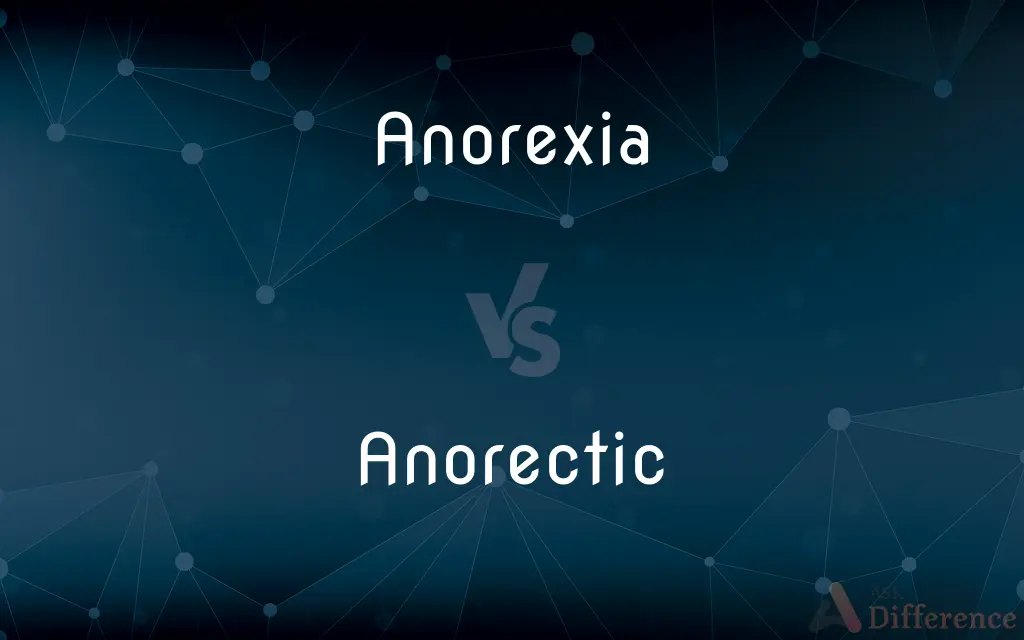Anorexia vs. Anorectic — What's the Difference?
Edited by Tayyaba Rehman — By Maham Liaqat — Updated on April 30, 2024
Anorexia refers to an eating disorder characterized by a distorted body image and severe dietary restriction, whereas anorectic describes a substance or drug that suppresses appetite.

Difference Between Anorexia and Anorectic
Table of Contents
ADVERTISEMENT
Key Differences
Anorexia, medically termed anorexia nervosa, is an eating disorder marked by an extreme fear of gaining weight and a severe restriction of food intake. While anorectic, often spelled "anorectic," pertains to appetite-suppressing properties, commonly used in the context of medications or agents that reduce the desire to eat.
Anorexia involves a deep psychological component, including intense body dysmorphia and an obsessive desire to lose weight. On the other hand, anorectic substances may be used therapeutically to control obesity, by pharmacologically reducing appetite.
While anorexia is diagnosed based on behavioral assessments and psychological evaluation, anorectic effects are typically assessed through physiological responses to specific drugs or treatments.
People suffering from anorexia nervosa usually undergo psychological counseling and nutritional management as part of their treatment. In contrast, anorectic drugs are often prescribed as part of a medical treatment plan that includes diet control and physical activity.
While anorexia has been widely studied as a serious and potentially life-threatening mental health condition, **anorectic substances are researched for their potential benefits and risks in managing obesity and other health conditions related to overeating.
ADVERTISEMENT
Comparison Chart
Definition
A psychological disorder characterized by low body weight and an intense fear of gaining weight.
Refers to substances that suppress appetite.
Primary Association
Mental health and eating habits.
Medication and treatment for obesity.
Treatment Approach
Psychological counseling, nutritional intervention.
Prescription of drugs, dietary management.
Impact on Health
Can lead to severe malnutrition and psychological issues.
Aimed at reducing food intake to manage weight.
Usage in Medical Context
Used to describe a clinical diagnosis.
Used to describe a property of certain substances.
Compare with Definitions
Anorexia
An eating disorder marked by an obsessive fear of gaining weight.
Anorexia nervosa often requires comprehensive treatment involving mental health professionals.
Anorectic
Describing a drug that reduces appetite.
The doctor prescribed an anorectic to help with her weight loss efforts.
Anorexia
Psychological aversion to food.
Psychological interventions can help address the anorexia seen in depressive disorders.
Anorectic
Pertaining to a substance that leads to loss of appetite.
Some over-the-counter cold medicines have anorectic effects.
Anorexia
A lack of appetite or an aversion to food.
After her surgery, Julia experienced anorexia that made meal times challenging.
Anorectic
Referring to the symptom-suppressing quality regarding food intake.
The anorectic properties of the new medication were evident after a few doses.
Anorexia
A clinical syndrome associated with certain diseases, where patients show no desire to eat.
Cancer-related anorexia is often managed with nutritional support.
Anorectic
Used to denote drugs in weight management therapy.
Phentermine is an anorectic that is often used under strict medical supervision.
Anorexia
A condition often misunderstood as mere dieting by those unfamiliar with its severity.
Many people mistakenly believe anorexia is simply an extreme diet choice.
Anorectic
Relating to the medical treatment of obesity and related disorders.
Anorectic agents are sometimes controversial due to potential side effects.
Anorexia
Loss of appetite, especially as a result of disease.
Anorectic
An anorectic or anorexic is a drug which reduces appetite, resulting in lower food consumption, leading to weight loss. By contrast, an appetite stimulant is referred to as orexigenic.
Anorexia
Anorexia nervosa.
Anorectic
Marked by loss of appetite.
Anorexia
Loss of appetite, especially as a result of disease.
Anorectic
Suppressing or causing loss of appetite.
Anorexia
Anorexia nervosa.
Anorectic
Of or affected with anorexia nervosa.
Anorexia
Want of appetite, without a loathing of food.
Anorectic
One who is affected with anorexia nervosa.
Anorexia
A prolonged disorder of eating due to loss of appetite
Anorectic
An anorectic drug.
Anorectic
Characterised by a lack of appetite, especially as suffering from anorexia nervosa; anorexic.
Anorectic
Causing a loss of appetite.
Anorectic
A person suffering from anorexia nervosa; an anorexic.
Anorectic
A drug or dietary supplement that reduces the appetite so as to promote weight loss.
Anorectic
A person suffering from anorexia nervosa
Anorectic
Suffering from anorexia nervosa; pathologically thin
Anorectic
Causing loss of appetite;
An anorectic (or anorexigenic) drug
Common Curiosities
What does anorectic mean?
Anorectic refers to something, typically a medication, that suppresses or reduces appetite.
What are common uses of anorectic drugs?
Anorectic drugs are primarily used to treat obesity by reducing appetite.
What is anorexia?
Anorexia is a psychological disorder where individuals fear gaining weight and severely limit their food intake.
How is anorexia treated?
Treatment for anorexia typically includes psychological counseling and nutritional therapy.
Is anorexia considered a mental illness?
Yes, anorexia nervosa is recognized as a mental health disorder.
Can anorexia lead to other health issues?
Yes, anorexia can cause severe health issues, including malnutrition and heart problems.
What is the difference between anorexia and simple dieting?
Anorexia involves extreme psychological distress and unhealthy eating patterns, unlike dieting which is typically a healthy habit adjustment.
Are anorectic substances safe?
While effective, anorectic substances can have side effects and should be used under medical supervision.
Can anorectic drugs lead to dependency?
Yes, some anorectic drugs can be addictive and lead to dependency if not properly managed.
What are examples of anorectic substances?
Examples include phentermine and amphetamine derivatives used to suppress appetite.
Can anorexia be cured?
Anorexia is treatable, but recovery can be a lengthy process involving both physical and mental health treatment.
Who may need to use anorectic substances?
Individuals struggling with obesity or weight-related health issues might use anorectic substances as part of their treatment.
What are the psychological factors of anorexia?
Psychological factors include body dysmorphia and extreme fear of weight gain.
How do anorectic drugs function?
They work by affecting certain chemicals in the brain to reduce hunger.
What is the societal impact of anorexia?
Anorexia can have broad social implications, including influencing public perceptions of body image and eating disorders.
Share Your Discovery

Previous Comparison
Hooray vs. Yippee
Next Comparison
Irredentism vs. RevanchismAuthor Spotlight
Written by
Maham LiaqatEdited by
Tayyaba RehmanTayyaba Rehman is a distinguished writer, currently serving as a primary contributor to askdifference.com. As a researcher in semantics and etymology, Tayyaba's passion for the complexity of languages and their distinctions has found a perfect home on the platform. Tayyaba delves into the intricacies of language, distinguishing between commonly confused words and phrases, thereby providing clarity for readers worldwide.
















































